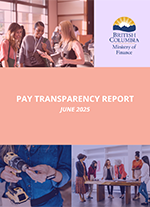Pay transparency in B.C.
Last year, women in British Columbia earned, on average, 15 percent less than men. This pay gap is even more pronounced for women and gender-diverse individuals who are Indigenous, racialized, newcomers, disabled, and/or 2SLGBTQIA+.
The Pay Transparency Act became law on May 11, 2023, and B.C. employers must meet the following requirements to help address the gender pay gap:
- Job postings: Employers must include the expected pay or pay range in all public job postings. This promotes transparency and fairness in the job market. Learn more about this requirement.
- Pay history: Employers cannot ask job applicants about what they have been paid by other employers. This helps break the cycle of discrimination against women and gender-diverse people. Employers may still use pay history information they already have about an employee to determine pay for a new position.
- Employer reprisal: To foster open discussions about compensation, employers cannot dismiss, suspend, demote, discipline or harass an employee who:
- Asks about their pay
- Reveals their pay to another employee or job applicant
- Asks about their employer’s pay transparency report
- Pay transparency reports: Employers above a certain size must post annual pay transparency reports by November 1 each year. This phased requirement promotes employer accountability by publicly showing the status of gender pay gaps within organizations. Learn how to prepare a pay transparency report.
The Act requires the Minister of Finance to publish an annual report by June 1 each year that describes the differences in pay among genders, trends in relation to those differences and the number of reports of non-compliance with the Act, based on information from the previous calendar year.
More information:
- Guidance on Wage or Salary Information on Job Postings
- Stats Canada Gender Pay Statistics 2024
- Canadian Women’s Foundation
Related organizations:
Questions on pay transparency requirements?
Other general inquiries:


